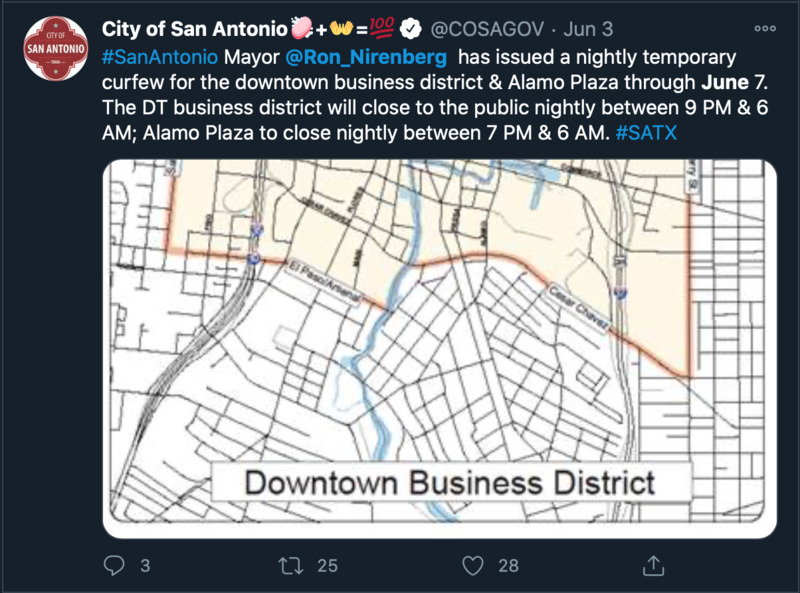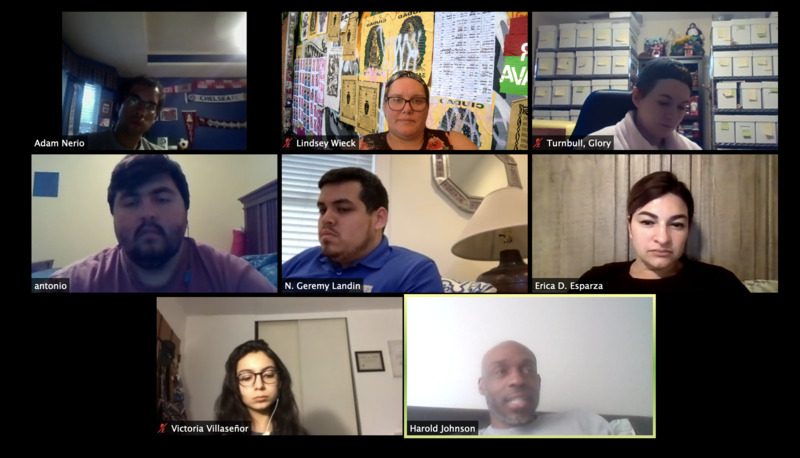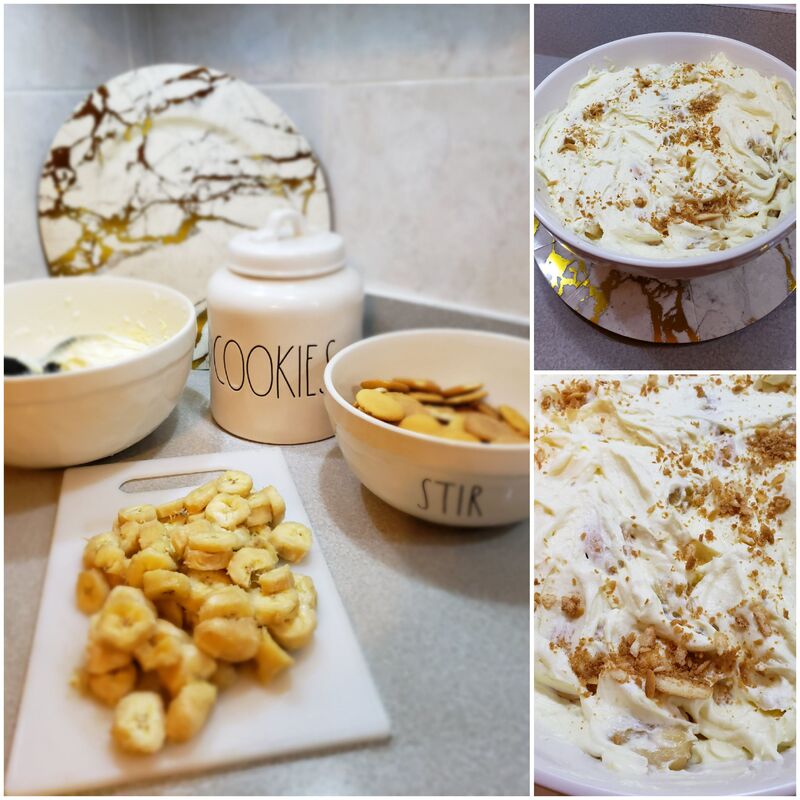Items
Tag
stayhome
-
 May 5, 2020 - August 31, 2020
May 5, 2020 - August 31, 2020M.A. in Zoom pt. 2: The Myth of Summer
This entry is the second part to capturing what the first six months of my graduate school experience was like. I’m a graduate student in the public history program at St. Mary’s University in San Antonio, Texas. I, like many students throughout all levels of education, felt a dramatic shift during or following spring break 2020. As the world began to catch on fire, I was just starting to piece together my final project which would enable me to graduate with my M.A. degree. Despite the chaos, I managed to survive the rest of the semester, and actually get a good head start on my project. I achieved two new job opportunities and reunited with my boyfriend after going two months without seeing each other. Things were going really well for me and I found a sense of confidence I hadn’t felt in three months. A confidence that might’ve crossed the line into arrogance. This is when I actually got serious about the pandemic. I chose to forget that just because things were going well in my world, didn’t mean things were going well in the real world. I, along with many of my fellow citizens, gave in to the idea that the south Texas heat would significantly curb the spread of the virus. As Texas began to open up, I began going out–not just for academic purposes but also for my own selfish desires to feel myself again. I returned to my local gym. I ate out (in doors) at restaurants. I went to an outdoor bar with my parents (one that was not abiding by the six feet separation policy). I heard the medical experts’ warnings against the loosening of restrictions; I was aware of the slowly but still increasing COVID cases in the city, but chose to act selfishly. This selfishness transferred over to my academic goals. I was blinded by my ambition (or anxiety) to hit the ground running with my capstone. Maybe I knew that after a certain point, it would no longer be safe nor socially acceptable to meet with people outside of my immediate community. The second and third photos were taken from the first sets of oral histories I conducted with my community partners, the Ballet Folklórico de San Antonio. This is Bonnie Ramos and Mark Molina, the head creative directors of the Ballet Folklórico de San Antonio. Prior to these interviews, I had to meet with these leaders to plan out these interviews. We were all fully ready to conduct in-person oral histories not only with these two, but also their friends and family members. In the second photo, we were more conscious of the virus as you can see Ms. Ramos is wearing a mask. However, in the following interview with Bonnie and Mark, done just [two] weeks later, you can see that we chose to let our guards down (falling in line with the rest of the San Antonio, and overall Texas, community). In both photos we made sure to keep a distance between us, but we did not measure exactly six feet. Off camera, we also made sure to interact at a distance, however, we all chipped in to set the interview setting. In between interviews I came down with a case of strep throat. I had to get tested for COVID and the results came two days later, which means my family and I held our breaths for two days. Thankfully I was negative, but strep really kicked my butt. I thought to myself, “If this is what strep feels like, I don’t want to know what COVID feels like.” The doctor was very sure that I only had strep because I had no other symptoms (such as respiratory difficulties). However, COVID is different for everyone – so I heard. I began to drown myself in COVID statistics which made me feel even worse; but also made me snap and understand that I cannot be my control freak self in the midst of a pandemic. Included are some images of COVID statistics in San Antonio from the point that I contracted strep until the end of August. I thought about all the times I had gone out, regardless of being aware that I shouldn’t; I thought of all the people I had interacted with and how ashamed I’d me if I would have to call them; I thought of what I could potentially be putting my parents through because they have underlying conditions (diabetes and asthma). After a few days on antibiotics I was alright, but this was a wakeup call and my Ballet Folklórico project came to pause. Then Fourth of July hit, and San Antonio really milked the reduced restrictions. In the following weeks, San Antonio saw a spike in COVID-19 and the city promptly regressed back to prior restrictions. I cancelled my gym membership, my family cancelled our annual trip to the beach, and abstained from interacting with some friends and family. My household became a little blue; I felt a mixture of shame, fear, and frustration (towards myself and the state of Texas). As a public historian, I felt like I failed the community I serve by acting in my self-interests. Public historians share a larger responsibility to treat out community justly and with respect. However, I chose to contribute to the problem that I knew was still there; I gave in to my selfish desire for “normalcy” and potentially put my community partners at risk. Luckily, neither of us (myself, Bonnie & Mark, nor my camera man) have experienced any COVID-19 symptoms following our interviews nor up until now. Throughout the rest of the summer, all of the oral histories I conducted for my capstone were done via Zoom. My project was slowly transitioning to become a digital project, but I’ve come to see this as a strength and necessary change. It does not seem like Texas will have this virus completely under control, and many individuals will be hesitant to interact physically or outside their homes. Creating something digital will meet the needs of individuals while still taking precautions, as well as be more accessible to other researchers beyond San Antonio. COVID had made me acquaint myself with advanced-ish technology that will make all my projects throughout my career more accessible and therefore more equitable -
 March 8 2020 - May 4, 2020
March 8 2020 - May 4, 2020M.A. in Zoom pt. 1: Initial Anxieties & Adaptation
This entry is part one of two entries that capture the first six months of my graduate school experience. I’m a graduate student in the public history program at St. Mary’s University in San Antonio, Texas. I, like many students throughout all levels of education, felt a dramatic shift during or following spring break 2020. Most institutions, like mine, extended our spring break by a week to brace campus for transitioning fully online. At this time, I was enrolled in a course called “Conceptualizing your Capstone.” As the world began to catch on fire, I was just starting to piece together my final project which will enable me to graduate with my M.A. degree. Perfect timing. These are images of what my first semester of graduate school kind of boiled down to: completing the initial, most crucial, stages of my capstone virtually and completing my fellowship with what I felt were limited resources. What is not pictured was my constant fear of the unknown. Initial Anxieties For my capstone project I’ll be looking at the development of ballet folklórico in San Antonio and its influence throughout the state of Texas. I was looking forward to digging in our university and local archives; Fiesta was around the corner and I would’ve used that as an opportunity to document the different folklórico groups set to perform; and most importantly I had planned on meeting with the community members I’m working with face-to-face. The last point there was particularly concerning for me. I’d have to reach out remotely to a community who seldom opens their vaults to outsiders. How was I going to establish credibility and convince these groups that they could trust me via an email or Facebook message? The whole concept of my capstone project also might’ve had to change. I was originally looking to create a narrative history of Ballet Folklórico in San Antonio by drawing on the experience of my community partners–they are the earliest 501(c)(3) groups established in the city. In regard to my schoolwork, how was I going to produce legitimate work from the confines of my house? Was I even in the right place mentally and emotionally to perform at graduate level amidst social, political, and medical disarray that was being broadcasted? I was starting to get cabin fever; I could’ve ignored the commotion outside so I could focus, but that felt selfish. How could my mind be everywhere at once, yet my body needed to remain indoors? (These are actually a bunch of large questions I’ve had swirling in my head throughout the rest of March.) In late March, one of my brothers who’s a Texas State Trooper was ordered to quarantine for two weeks after someone in his unit contracted the virus. Then in mid-April, my other brother came down with something that gave him body aches, chills, fever, and made him sleep all day. No respiratory issues, however, we had no idea what was going on. He got tested for COVID and his results took four days to come back. Both my brothers tested negative, but these two events made it seem like the virus was everywhere and inhibited my ability to think and produce sound work. Adaptation After a couple of dramatic weeks, I got to a point where I could realize the amount of privilege my family and I managed to hold on to regardless of the dystopian-like transitions we were going through as a society. My dad and brothers could still commute to work (that has never been compromised throughout the past nine months), and my mom and I have been able to work from home; neither of us experienced a cut to our pay nor hours; I could get back to a regular sleep schedule because I no longer had to commute from campus, which is on the other side of town, late at night; we have stable WiFi; we have insurance; we’ve been able to pay our bills on time. In terms of academics, contrary to my initial anxieties, my experience in graduate school wasn’t really compromised. I had already established relationships with my peers and professors so Zoom classes and weekly meetings for my fellowship didn’t feel so awkward. Even if I didn’t have the first half of the semester to acquaint myself with my classmates, my generation is very much accustomed to digital communication. We literally grew up on it; we witnessed the evolution from wall phones to smart phones. Making digital connections isn’t a foreign concept to me. The pace of graduate school also didn’t change much. Yes, not having to commute to campus really alleviated a lot of my stress. However, the sense of urgency in graduate school did not fade one bit. I also underestimated the digital literacy of older generations. Specifically of the ballet folklórico community throughout Texas. Through the power of Twitter, Facebook, JSTOR, online university archives, and Zoom, I was able to build upon my research for my capstone. The individuals and groups I reached out to for help were surprisingly eager and generous. Maybe we were all craving some new faces or voices to interact with, or maybe I underestimated the power of engagement. I was able to build upon my capstone, and was probably more productive with it given that I had to stay in one place and work. Optimism was in the air. The first photo is a screenshot of our final presentations where we pitched our capstone idea to the St. Mary’s history department. We were originally set to present our capstone idea to the public history department (staff and students). Initially, I thought this experience would be compromised. I thought I’d miss out on forming connections with other professors in the program. However, there was a collective understanding these young academics (my peers and I) are in the midst of creating one of the most important pieces of our careers under unimaginable outside challenges. All hands were on deck in making sure we received the most help and access to whatever resources. It reinforced that I belonged to a community grounded in the belief that regardless of the circumstances, our duty is to assist each other in our pursuit to public history. I hope other graduate students across the city, state, country, and world experienced this same empathy. -
 2020-04
2020-04Coping with Quarantine
I must say 2020 so far was not what I expected it to be. I began Brooklyn College on January 30th, 2020 for spring semester after taking a 10 year break from when I received my associate’s degree.I enjoyed getting back into the swing of things and coming to campus, making new friends and getting to know my Professor’s and engaging in my classes. This was a new routine me and it was exciting but challenging as well, between work, home life and taking five classes to say I was super busy was an understatement. When I first heard of the Corona Virus and what was happening in China, the resilient New Yorker in me thought “ this is NYC that won’t happen to us, we are fine “ but I was wrong. I was truly blindsided when the virus started spreading and became a world wide pandemic. Sadly I realized that it was serious when the mass hysteria began and I could not find toilet paper, hand sanitizer and everyday cleaning products. Shortly after, College became remote and I found myself unemployed. My busy, hectic, challenging and exciting new routine suddenly came to a stop, but I would soon realize the blessing in disguise with this quarantine. I was now home with my Sixteen year old Son and we were both learning from home. It was not easy for me, I soon noticed that I learn better in a class setting. I found it difficult to give my full attention to my Professor’s and my assignments but I pulled through and found the discipline to pass all my classes. During the quarantine I needed to find ways to make life interesting for myself, my Son and Fiancé. We started spring cleaning early, I started cooking takeout dishes that we missed, such as Chinese fried rice and Magnolia Bakery’s Banana Pudding, and I even learned how to dye my roots blond. My family and I were blessed to not be affected by Covid-19 personally and the quarantine did bring us closer together and although 2020 was not what I expected I am thankful and blessed for what it has given me and I hope that we all can only move forward and I pray there won’t be a second wave. God Bless us all.
